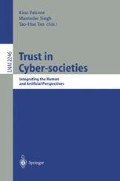Abstract
Evolutionary game-theory is a powerful tool to investigate the development of complex relations between individuals such as the emergence of cooperation and trust. But the propagation of genes is an unrealistic assumption when it comes to model fast-changing social interactions.We show how a transition frome volutionary game-theory to learning can be made. Specifically, we show how cooperation and trust can develop together through social interactions and a suited learning mechanism.
Access this chapter
Tax calculation will be finalised at checkout
Purchases are for personal use only
Preview
Unable to display preview. Download preview PDF.
References
Robert Axelrod and Lisa D’Ambrosio. An annotated bibliography on the evolution of cooperation. http://www.ipps.lsa.umich.edu/ipps/papers/coop/EvolofCoopBibliography.txt, October 1994.
R. Axelrod and W. D. Hamilton. The evolution of cooperation. Science, 211:1390–1396, 1981.
R. Axelrod. The Evolution of Cooperation. Basic Books, 1984.
Andreas Birk. Learning geometric concepts with an evolutionary algorithm. In Proc. of The Fifth Annual Conference on Evolutionary Programming. The MIT Press, Cambridge, 1996.
Andreas Birk. Robot learning and self-sufficiency: What the energy-level can tell us about a robot’s performance. In Proceedings of the Sixth European Workshop on Learning Robots, LNAI 1545. Springer, 1998.
Andreas Birk. Boosting cooperation by evolving trust. Applied Artificial Intelligence Journal, 14(8), September 2000.
Andreas Birk and Wolfgang J. Paul. Schemas and genetic programming. In Ritter, Cruse, and Dean, editors, Prerational Intelligence, volume 2. Kluwer, 2000.
Andreas Birk and Julie Wiernik. A successful strategy for a real-world instance of the n-player prisoner’s dilemma with continuous degrees of cooperation. Technical report, Vrije Universiteit Brussel, AI-Laboratory, 2000.
Babak Sadighi Firozabadi Cristiano Castelfranchi, Rino Falcone and Yao Hua Tan (eds). Special issue: Trust in agents. Applied Artificial Intelligence Journal, 14(8), September 2000.
Peter Dittrich, Andreas Burgel, and Wolfgang Banzhaf. Ra Robots and Autonomous Systems, 1998.
Gerald M. Edelman. Neural darwinism: Population thinking and higher brain function. In Michael Shafto, editor, How We Know, pages 1–30. Harper and Row, 1985.
Gerald M. Edelman. Neural Darwinism: The Theory of Neuronal Group Selection. Basic Books, New York, 1987.
D. Floreano and F. Mondada. Automatic creation of an autonomous agent: Genetic evolution of a neural-network driven robot. In Proceedings of the Conference on Simulation of Adaptive Behavior, 1994.
L.J. Fogel, A.J. Owens, and M.J. Walsh. Artificial Intelligence through Simulated Evolution. Wiley, New York, 1966.
R. Ghanea-Hercock and A. P Fraser. Evolution of autonomous robot control architectures. In T. C. Fogarty, editor, Evolutionary Computing, Lecture Notes in Computer Science. Springer-Verlag, 1994.
David Goldberg. Genetic Algorithms in Search Optimization and Machine Learning. Addison-Wesley, Reading, 1989.
John H. Holland. Adaptation in Natural and Artificial Systems. The University of Michigan Press, Ann Arbor, 1975.
John R. Koza. Genetic programming. The MIT Press, Cambridge, 1992.
John R. Koza. Evolution of a subsumption architecture that performs a wall following task for an autonomous mobile robot, volume II: Intersections Between Theory and Experiment, chapter 19, pages 321–346. MIT Press, 1994.
John R. Koza. Genetic programming II. The MIT Press, Cambridge, 1994.
Ingo Rechenberg. Evolutionsstrategie: Optimierung technischer Systeme nach Prinzipien der biologischen Evolution. Fromman-Holzboog, Stuttgart, 1973.
Gilbert Roberts and Thomas N. Sherratt. Development of cooperative relationships through increasing investment. Nature, 394 (July):175–179, 1998.
Hans Paul Schwefel. Numerische Optimierung von Computer-Modellen mittels der Evolutions-Strategie. Birkhäuser, Basel, 1977.
Karl Sims. Evolving 3D morphologgy and behavior by competition. In R. Brooks and P. Maes, editors, Artificial Life IV, pages 28–39, Cambridge, MA, 1994. MIT Press.
J. Maynard Smith. Evolution and the Theory of Games. Cambridge University Press, Cambridge, 1982.
Richard A. Watson, Sevan G. Ficici, and Jordan B. Pollack. Embodied evolution: Embodying an evolutionary algorithm in a population of robots. In Peter J. Angeline, Zbyszek Michalewicz, Marc Schoenauer, Xin Yao, and Ali Zalzala, editors, Proceedings of the Congress on Evolutionary Computation, volume 1, pages 335–342. IEEE Press, 1999.
Author information
Authors and Affiliations
Editor information
Editors and Affiliations
Rights and permissions
Copyright information
© 2001 Springer-Verlag Berlin Heidelberg
About this paper
Cite this paper
Birk, A. (2001). Learning to Trust. In: Falcone, R., Singh, M., Tan, YH. (eds) Trust in Cyber-societies. Lecture Notes in Computer Science(), vol 2246. Springer, Berlin, Heidelberg. https://doi.org/10.1007/3-540-45547-7_8
Download citation
DOI: https://doi.org/10.1007/3-540-45547-7_8
Published:
Publisher Name: Springer, Berlin, Heidelberg
Print ISBN: 978-3-540-43069-8
Online ISBN: 978-3-540-45547-9
eBook Packages: Springer Book Archive

